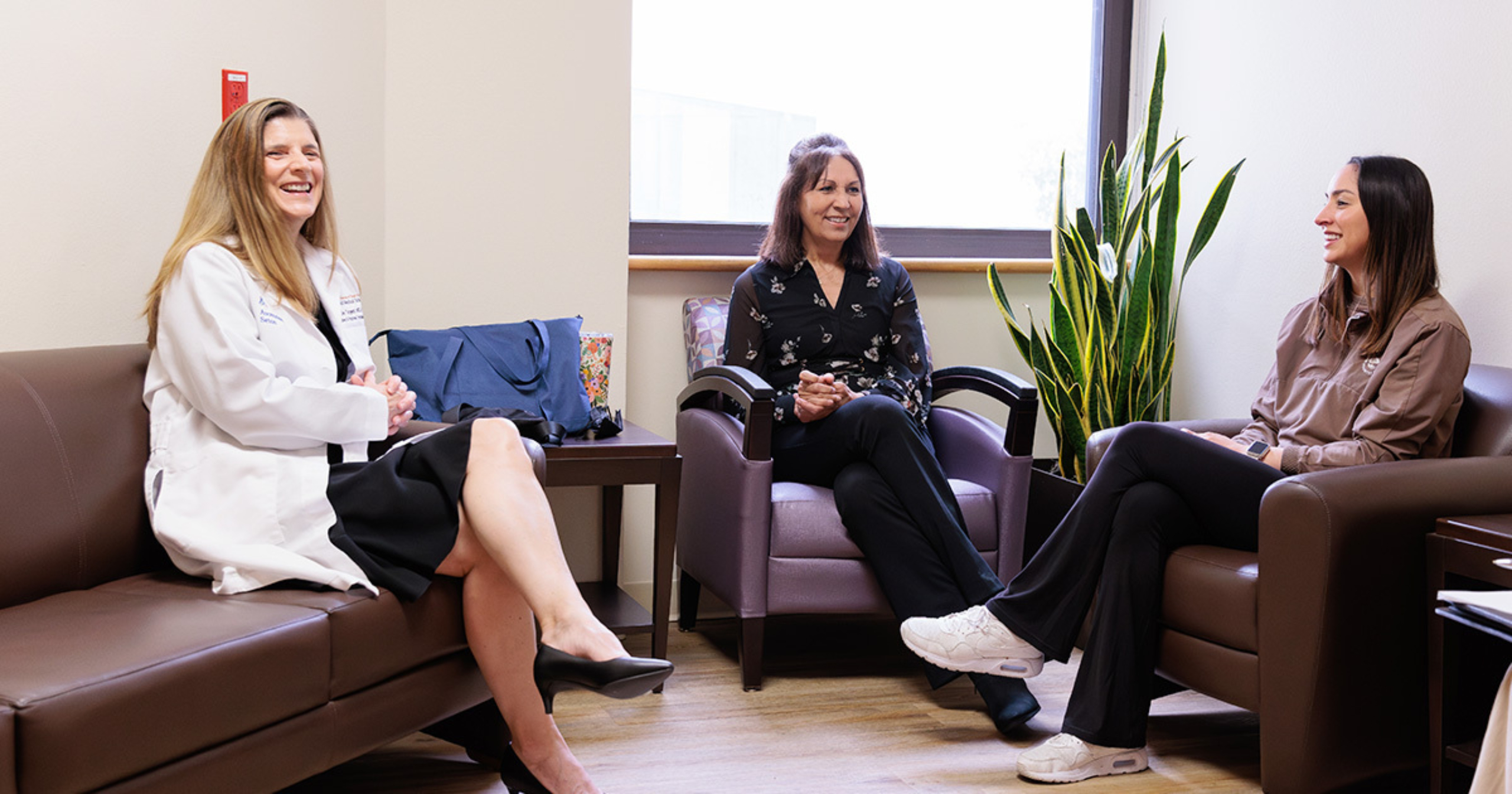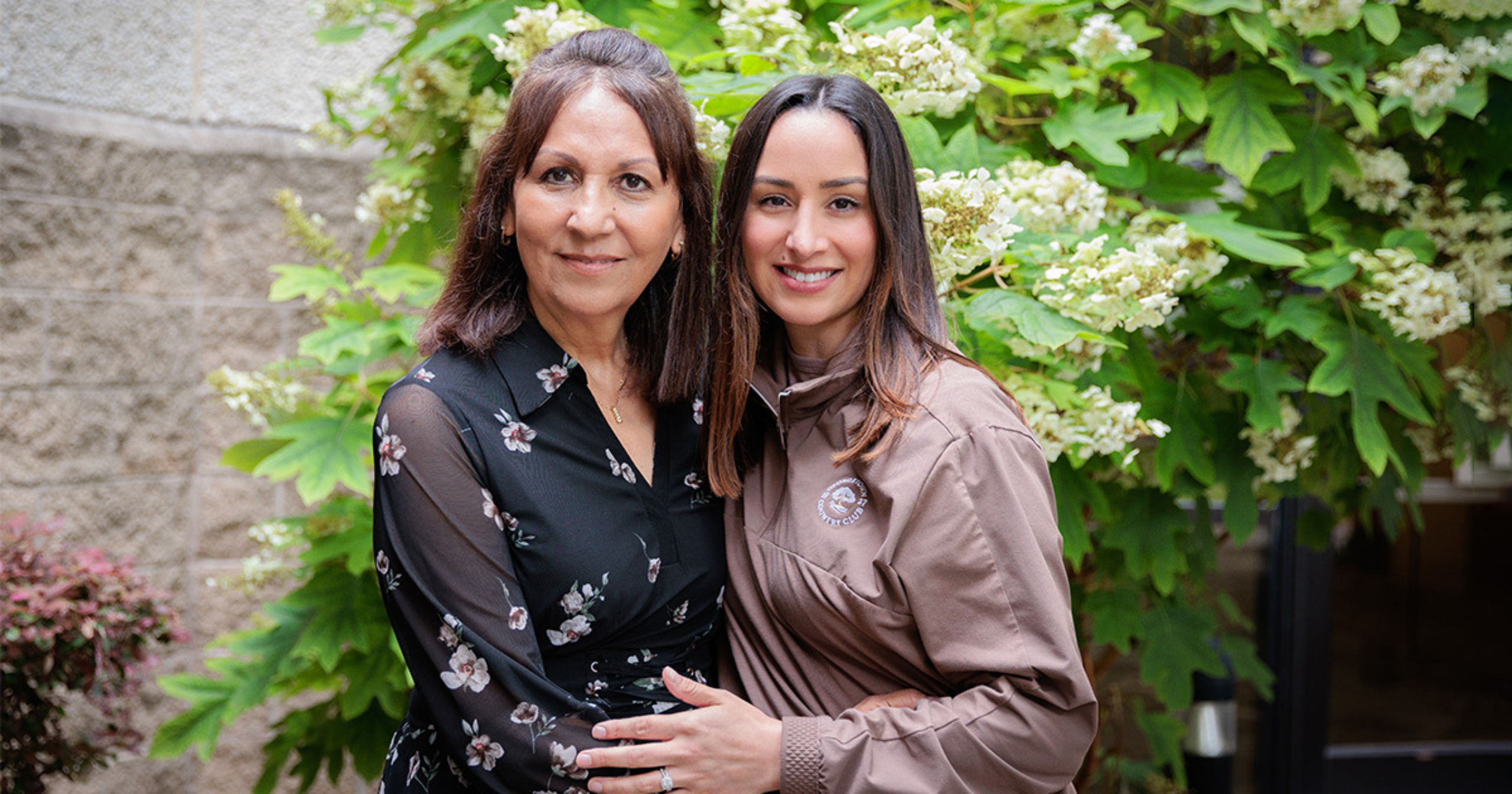Daughter’s Selfless Act Saves Her Mother’s Life and Inspires a Life-Saving Transplant Chain
Daughter selflessly donates her kidney to a stranger after discovering she isn’t a match for her mother
Reviewed by: Julie, Kelli, and Nicole Turgeon, MD, FACS
Written by: Ashley Lawrence
In December 2021, Julie’s life took an unexpected turn. At 63, she was diagnosed with kidney failure and placed on dialysis. “It happened so suddenly,” says Julie. “One day, I was walking three miles a day, and the next, I could hardly do anything. My doctor told me, ‘We’re going to have to put you on dialysis.’”
Julie’s daughter, Kelli, was shocked by the news. “It didn’t make sense to us,” recalls Kelli. “Our mom has always been so active. She’s always on the go. Plus, both of my grandparents are still alive at 98 and 85—she seemed too young to be dealing with this.”
“This is a very common situation,” explains UT Health Austin abdominal transplant surgeon Nicole Turgeon, MD, FACS, who serves as the Transplant Director for the Abdominal Transplant Center, a clinical partnership between Ascension Seton and UT Health Austin. “Often, people are unaware that they have kidney failure until they end up in the emergency room. Sometimes, it’s the result of not seeking medical care early, but other times, no matter how well someone takes care of themselves, kidney disease progresses, and a transplant becomes necessary.”
Julie’s doctor immediately referred her to the Abdominal Transplant Center, which had just opened in Austin the month before. The Kidney Transplant Program within the Abdominal Transplant Center provides comprehensive care for adult patients with chronic kidney disease or end-stage renal disease. The Abdominal Transplant Center care team consists of board-certified and fellowship-trained transplant surgeons, transplant nephrologists, transplant coordinators, physician assistants, nurses, advanced practice providers, health social workers, dietitians, pharmacists, and more who work together to provide patients the highest level of care.

“The care team was phenomenal, and I truly have nothing but great things to say,” shares Julie. “Sometimes, I would arrive early for my appointments, and other patients would sit down and talk about how in awe they were about the way everyone involved in our care would come together as a team. From the office staff to the doctors and nurses, everyone was in perfect sync. It was incredible.”
“At the Abdominal Transplant Center, patients are cared for by a dedicated multidisciplinary care team, meaning they will benefit from the expertise of multiple specialists across a variety of disciplines,” adds Dr. Turgeon. “This care model plays a pivotal role in guiding patients through their care journey — from the initial evaluation of a patient’s situation and needs through their surgery and into their follow-up care. The cohesion of care team members is essential for the patient’s ongoing success. This is what we strive for, because how patient perceive their transplant journey is paramount to us.”
Learn more about Dr. Turgeon’s commitment to empowerment.
<br>The Power of Paired Exchange
When Kelli learned about her mother’s diagnosis, she immediately decided she was going to donate her kidney to her. “Having lost my dad to cancer nine years ago and with my older brother being a cancer survivor, our family has been through a lot,” explains Kelli. “My mother and I are incredibly close, and I didn’t even consider the possibility that I might not be a match for her. But when I found out that I wasn’t, I was still prepared to move forward with donating to someone else on her behalf.”

Through the Living Kidney Donor Program, a specialty program within the Abdominal Transplant Center, patients can participate in a paired kidney exchange program that helps incompatible donor-recipient pairs find matches for a kidney transplant. The average wait time for a transplant through the paired kidney exchange program is approximately four months.
Kelli participated in this program, donating her kidney to another recipient while someone else’s kidney was donated to her mother, allowing her to receive a life-saving transplant. This exchange initiated a chain of donations, helping several recipients receive a living kidney transplant that otherwise wouldn’t have been possible.
“I participated in the National Kidney Registry’s Standard Voucher Program through the Living Kidney Donor Program at the Abdominal Transplant Center, which allowed me to choose the donation timeframe that worked best for myself and my family,” shares Kelli. “Being able to donate at a time separate from my mother’s surgery worked out even better for us, as she was able to help care for our 18-month-old while I recovered.”
Through the National Kidney Registry’s Standard Voucher Program, an eligible living kidney donor can choose the most convenient timeframe for their donation surgery and provide one or more vouchers to people who can be prioritized to receive a living donor kidney through the NKR if/when they need a transplant. This type of donation is often referred to as a paired kidney exchange separated by time.
If you are interested in being considered for living kidney donation, please complete the online medical screening questionnaire.
<br>“The Abdominal Transplant Center care team was so wonderful,” adds Kelli. “They made sure I was fully educated about living donation and constantly reminded me that I didn’t need to make a decision right away. I never felt pressured or forced, and they even worked with me to make sure the timing was right for me and my family.”
Learn more about the benefits of living donation.
<br>A Life-Saving Donation
On September 12, 2023, Kelli underwent kidney donation surgery. “While I wish my mother didn’t have to wait so long for her surgery, I needed time to recover after a very difficult pregnancy,” notes Kelli. “I wanted to make sure I was the healthiest version of myself for both her and my family.”
Six months later, Julie was notified of a compatible match. After being on dialysis for two years and three months, she underwent kidney transplant surgery on March 20, 2024. Post-surgery, Julie’s quality of life has significantly improved. She no longer spends nine hours a week on dialysis and is already back to walking multiple miles a day.
“I’ve been entrusted with a precious gift that I will always cherish and take care of to the best of my ability,” shares Julie.
Since the Abdominal Transplant Center opened in November 2021, the care team has completed 79 transplants and 42 donations. The Abdominal Transplant Center also offers services for patients in need of a pancreas transplant and those who may need a simultaneous kidney and pancreas transplant. Dr. Turgeon plans to expand her practice by developing programs for patients in need of liver transplants as well.
For more information about the Abdominal Transplant Center or to request an appointment, please call 1-512-324-7930 or visit here.